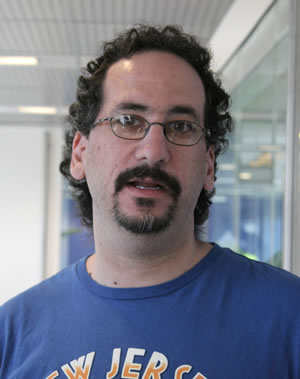Aaron Zimmerman
As a child, Aaron Zimmerman understood what it meant to be an outsider: his family moved often and he felt rootless. Drawn to acting and writing, he received little encouragement. When Zimmerman found his own voice as a writer, it proved a revelation. And it inspired him to encourage others to find their own voices as well.
Zimmerman was leading creative writing workshops in New York City when he received a call from the Prince George Hotel, a large supportive housing project, looking for someone to launch a writing program for its residents. “When I got that call,” he recalls, “I almost jumped out of my skin…I had always dreamed of helping others to use their writing as a way of being heard.”
Within months, Zimmerman had founded the New York Writers Coalition (NYWC) with colleagues who shared his conviction that telling one’s own story is a basic human need and who believed in the transformative effect of such storytelling.
Over the past four years, with very limited resources, Zimmerman has recruited scores of activist writers and built NYWC into one of the largest community writing programs in the United States. Training other teachers by modeling how to create an atmosphere of respect, honesty and clarity of purpose, Zimmerman tailors each workshop’s exercises to meet the needs of such diverse groups as teenage girls who are at risk of gang involvement; men and women leaving the criminal justice system, seniors who live in a neighborhood being transformed by gentrification; the homeless and formerly homeless; people living with psychological disabilities, with cancer or with HIV/AIDS; and adults who survived the collapse of the World Trade Center.
Zimmerman likes to quote Martin Espada in Poetry Like Bread, “Any oppressive social condition, before it can be changed, must be named and condemned in words that persuade by stirring the emotions, awakening the senses.” It is in that spirit that NYWC teenager Alicia Hamlett entitled one of her poems “The Opposite of Safe is Home.” And it is in that spirit that the World Trade Center Survivors Network created a group piece to protest the “strange comfort that I receive / I never wanted to know these questions / I never wanted to be given these answers / I wanted to remain /as I was / Ignorant of the raw heart of the world.” A man whose battle with AIDS landed him in a wheelchair before it killed him, ruefully celebrated his 41st birthday with a poem that ends, “I see marvels / I see grace / I see myself so / sadly out of place.”
To make sure these writers are heard, Zimmerman publishes their work in affordable paperbacks, oversees a participant-edited online literary journal and has established a monthly “Writing Aloud” series that presents readings by established writers along with NYWC participants. Some workshop members have returned to college, enrolled in other writing courses or gone on to have their poems, stories and plays published. Others have read their work on NPR’s All Things Considered and WNYC’s Brian Lehrer Show. But Zimmerman finds the most satisfaction in watching first-time writers experience the power of their own voices.
As small-town doctor and poet of modern American life William Carlos Williams wrote:
“It is difficult / to get the news from poems / yet men die miserably every day / for lack / of what is found there.”
 Photo by Dorothea von Haeften
Photo by Dorothea von Haeften